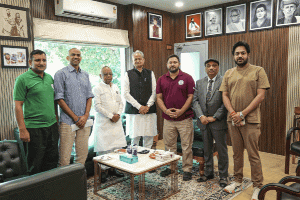Muslim Representation in Bihar Politics: Tejashwi Yadav’s new strategy could redefine Muslim representation in the state. With elections nearing, the Grand Alliance faces its biggest test—will Muslims get the leadership role they deserve?
By Dr. Mohammad Farooque, Qalam Times News Network
Kolkata | October 24, 2025

Muslim Representation in Bihar’s politics has once again become a key talking point after Tejashwi Yadav’s recent announcement reshaped the state’s political landscape. The Grand Alliance’s decision to officially project him as its Chief Ministerial face is not only an extension of Lalu Prasad Yadav’s political legacy but also a bold move that has sent shockwaves through the NDA. Yet, the pressing question echoing across Bihar is this: Will this new political arrangement finally give Muslims the representation they deserve—one that matches their population, history, and political significance?
The Numbers Behind Muslim Representation
Muslims make up around 17 to 18 percent of Bihar’s total population—roughly three crore people. Out of 243 Assembly seats, nearly 38 constituencies have decisive Muslim Representation, particularly in Seemanchal, Kishanganj, Araria, Katihar, Purnea, Madhubani, and Darbhanga. When the Grand Alliance defeated the NDA in 2015, not a single Muslim was appointed Deputy Chief Minister. Although a few Muslim ministers found a place in the cabinet, they remained distant from real decision-making.
Since the 2020 elections, Muslim Representation has further declined. Despite Muslims overwhelmingly voting for the Grand Alliance, the number of Muslim MLAs dropped from 24 in 2015 to just 19 in 2020. This steady fall reveals a political pattern—Muslim votes are courted for numbers but rarely rewarded with leadership roles. And now, as new alliances take shape once again, that leadership gap remains painfully visible.
A Possible Shift in Political Balance
Tejashwi Yadav’s recent statement—hinting that the new cabinet could have multiple Deputy Chief Ministers—has sparked speculation that a Muslim leader might finally be considered for the post alongside Mukesh Sahani. If that happens, it would be a strategic masterstroke for the Grand Alliance. Historically, coalition governments have maintained such delicate social and regional balance—something even Atal Bihari Vajpayee understood well at the national level. In a socially layered state like Bihar, this balance isn’t just symbolic; it’s essential.
A Legacy of Strong Muslim Voices
Bihar’s political history is rich with strong Muslim Representation—leaders like Shahabuddin, Abdul Bari Siddiqui, Shakeel Ahmad, and Taslimuddin once commanded influence and respect. But over the last decade, Muslim leadership has been pushed to the margins. Even Nitish Kumar’s governments, while occasionally offering token appointments, kept decision-making power limited to a few.

If Tejashwi Yadav truly wants to represent change, he must go beyond symbolic gestures and demonstrate fairness in the actual distribution of power.
The Stakes for the Grand Alliance
Within the current seat-sharing arrangement, RJD has 144, Congress 70, and VIP 18 seats. If Muslim candidates are again given only a token presence, it will signal political short-sightedness. In regions like Seemanchal, appointing a Muslim Deputy Chief Minister could transform the entire narrative—strengthening public trust, reinforcing communal harmony, and ensuring a clear electoral edge for the Grand Alliance.
A Moment of Political Maturity
When Rahul Gandhi and Tejashwi Yadav appeared together during the Voter Adhikar Yatra, it stirred hope for a new political chapter. But Congress’s delayed decision-making later cooled that momentum. Now, with just two weeks before polling, Tejashwi has one last chance to prove his political maturity. If he includes a capable and popular Muslim leader among his deputies, it will send a powerful message that Bihar’s politics is moving beyond caste equations toward inclusiveness and justice.
The Real Test of Muslim Representation
Bihar’s Muslim voters are no longer passive participants. They are politically aware, conscious of their weight, and unwilling to be swayed by empty slogans. If the Grand Alliance offers them genuine Muslim Representation in the corridors of power, it won’t just secure electoral victory—it will earn moral legitimacy. Otherwise, the resulting disappointment and silent protest could cost Tejashwi Yadav far more than a few seats—it could cost him his credibility.







